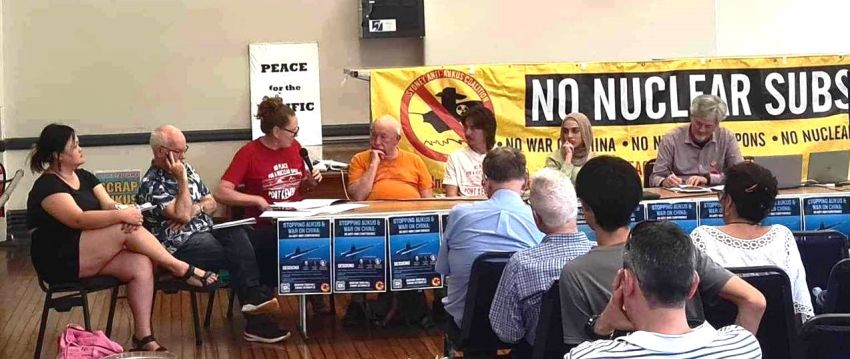
The Australia-United States military alliance and the complexities of building an anti-war movement were discussed at the Sydney Anti-AUKUS Coalition conference at the Redfern Town Hall on October 22.
Veteran anti-bases activist Elizabeth Hulme from Stop AUKUS WA outlined the history of US military installations, including bases at Geraldton, Stirling and North West Cape and discussed the campaign against proposed port sites for US and British nuclear powered and armed submarines.
The bases have long provided intelligence surveillance to US allies.
Denis Doherty from the Australian Anti-Bases Campaign Coalition said Australia is host to more than 50 US bases of various kinds. They are being used to store weapons, for spying and surveillance; as aircraft landing grounds and bombing ranges.
Doherty said given the climate crisis, the anti-war movement needs to “seek combined action” with the environment movement. “We need to promote alliances with unions and other community groups to achieve our joint aims.”
Bevan Ramsden, from the Independent and Peaceful Australia Network, spoke about the campaign to terminate the Force Posture Agreement (FPA). It provides for “unimpeded access” for US ships and planes to Australian ports and other facilities.
“The FPA facilitates military support for a future war on China,” Ramsden said. “Under the agreement, the basing of nuclear subs and other warships close to Australian cities is a major safety concern.”
Jason Bilney from the Barngarla Determination Aboriginal Corporation outlined the fight by South Australian Native Title holders to prevent a high-level nuclear waste dump being sited on their land. “We'll continue the fight until we win, as we have before,” he said.
Jim Green, Friends of the Earth anti-nuclear spokesperson, said: “No country in the world currently has a repository for high-level nuclear waste. Now there is a renewed push by the federal Labor government to establish an international high-level nuclear waste dump on Aboriginal land.
“Is AUKUS a stepping stone toward a wide nuclear industry? Possibly. In any case, Coalition opposition leader Peter Dutton is pushing for nuclear power and wants to argue that opposing nuclear development would be ‘jeopardising national security’.”
A final panel titled “Resisting war then and now: Social movements, unions and resistance to war,” tackled the history of the peace movement and the challenges facing anti-war activists.
Denis Golding, a veteran anti-Vietnam War activist and former NSW Builders Labourers Federation militant, spoke about building up the anti-Vietnam War movement. It began by the initially uniting small groups and culminated in the mass Moratorium marches of 1970-1971, which forced the government to withdraw Australian troops in the next few years.
Long-time peace activist Peter Murphy spoke about the complexities of building the movement against the Iraq war in the early 2000s, as well as the campaign against the invasion and occupation of Afghanistan in the same period.
He said a high point was the mass rally of hundreds of thousands of people, in February 2003, against the Iraq invasion. Different peace and anti-war coalitions stayed active as the Iraq and Afghanistan wars became increasingly unpopular. Australian troops were finally removed from Iraq in 2008-2009.
Luke Hocking, representing Wollongong Against War and Nukes, said the local community opposes Port Kembla becoming a nuclear submarine base. That was demonstrated when thousands marched against the base proposal on May Day.
“Now, we need strikes and broad workers’ support to build a strong anti-war movement which can stop AUKUS and the plan for a nuclear submarine base anywhere in the country,” Hocking said.
Natasha Watt, from the NSW Teachers Federation, said the Illawarra Teachers Association was working closely with WAWAN. “The question of peace is linked to education, health and other social services in society. We are currently campaigning against the introduction of militarism into the school curriculum,” she said.
Palestinian activist Amal Naser reflected on the huge pro-Palestine rallies in Sydney and worldwide and criticised Labor’s policy to support Israel’s genocide in Gaza.
“There are close links between AUKUS and Australia’s position on Palestine and Israel,” Naser said. “They are both connected to Australia’s total support for US imperialist war policy against China and its drive to maintain world-wide domination, including the Middle East and Asia.
“We need to keep building the anti-war movement in all areas. Union solidarity is a vital part of this campaign,” Naser said.
Feiyi Zhang from SAAC said: “AUKUS strengthens the role of nuclear subs, drones, missiles, naval and air forces and land war preparations in Australia, in close collaboration with the US”. She also reinforced the link between the war on Gaza and the anti-AUKUS movement.
SAAC is working with WAWAN and other groups to build a new peace movement against AUKUS, Zhang said and she urged people to become active.
[Join the protest against the Indo-Pacific Naval Expo at the International Convention Centre, Darling Harbour, on November 7, 11am. Meet at Chinese Friendship Garden.]